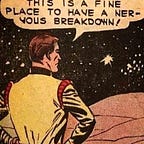Lesson 3: Mindfulness Is Not Hokey Bullshit
In my last post, I briefly mentioned how beneficial mindfulness can be. Everyone knows this, it’s been shown in studies, it zips by you in articles you don’t click on or your mate Percy bangs on about it being the bee’s knees. There’s a lot of things out there and mindfulness is just one of them. When it gets mentioned all the time, but you still haven’t started it, it starts to sound annoying or feels like it’s passed you by already. Like that Netflix show ‘you should totally watch’.
I tell you what though, that Netflix show ain’t gonna do diddly for your mental health. And mindfulness is. It doesn’t just mean meditation and it’s more than a passing fad for white people. It’s not a juice cleanse. It’s essentially a lesson in self-awareness.
Self-awareness reduces suffering because through understanding ourselves, without judgement, we no longer just react to all our feelings and thoughts, and then react to those reactions and so on and so on.
It’s like when you tell yourself you’re an idiot for doing that very stupid thing. Then telling yourself you’re an idiot makes you feel bad, and then feeling bad makes you think even more about the fact you’re an idiot, and you start to think you’re an idiot all the time, and that makes you feel worse, and then you feel like you’ve been an idiot FOREVER. And then you have a breakdown.
However, if you practise inquisitive self-awareness, i.e. mindfulness, on that first thought of being an idiot and the negative feeling that comes with it, you simply go ‘huh’. Recognise it and let it go. You don’t try to purge that thought with more thoughts, willing yourself to be better and inferring your own not-good-enoughness by doing so.
This process, that for some reason is a default for a lot of us, is like trying to douse a petrol fire with more petrol. Mindfulness is more like watching the flames and letting them die down naturally.
This is the single most important thing to learn to improve wellbeing. It’s learning to accept and live with your thoughts and feelings, positive or negative. Essentially, this is what you hear about in Buddhist philosophies - the difference between ‘experiencing pain’ and ‘suffering pain’ . Pain is part of life, suffering is what we add to it.
But if that makes you feel like you’re culturally appropriating somehow, as though the key to greater peace should only belong to one set of people, mindfulness and meditation is not the only way to become more self-aware. To stop living reactively to your thoughts and feelings in a tight little ball of terribleness but not understanding why. Asking God or blaming your environment as if the fault lies with them.
The fault lies in you. I say that in the nicest way possible. It’s not your fault, but the fault is in you.
If you don’t think you can go to a meditation class or even sit still in your room to practice with an app, you could try simply learning a bit about the theory of how our minds and emotions work from a book or a YouTube video. There’s plenty of them out there. If you don’t like the hokey woo-woo side of things, there’s many people who talk or write about it in a much more down to Earth, not spiritually enlightened and living-on-a-bench-now type people. Ruby Wax talks about it in her books on mental health. Russel Brand talks about it in his videos (although sometimes he does sound more woo-woo than others). Check out Sam Harris, Brené Brown, Alan Watts, whoever. These people might not necessarily class themselves mindfulness teachers, but what they’re talking about is still varying ways to be mindful and self-aware. Find someone who works for you.
Then there’s therapy. Cognitive behavioural therapy, psychotherapy, counselling. These things also help us explore how our minds work and our unhelpful default patterns. Simply being aware of them is a massive step towards not always being squashed by them.
A lot of yoga practices, too, teach us to be mindful not just of our bodies but of our thoughts and feelings as well. And even focusing on the physical, your breath and stretches, is exercising your awareness. It relieves you from your thoughts, focusing awareness on your body and movements, and that’s good, but that same kind of awareness can be applied to our mind or our feelings.
Search your feelings (young padawan) and see what you discover about yourself. Be interested, not judgemental.
Anybody that talks about mental health is talking about greater awareness of ourselves. Any practice or management of it is a form of mindfulness. Don’t dismiss the buzzword. Cut to the truth of it. Find a way to learn self-awareness that suits you.
You will come up against varying forms of resistance along the way, but resistance is just another thing you can learn to be mindful of.
